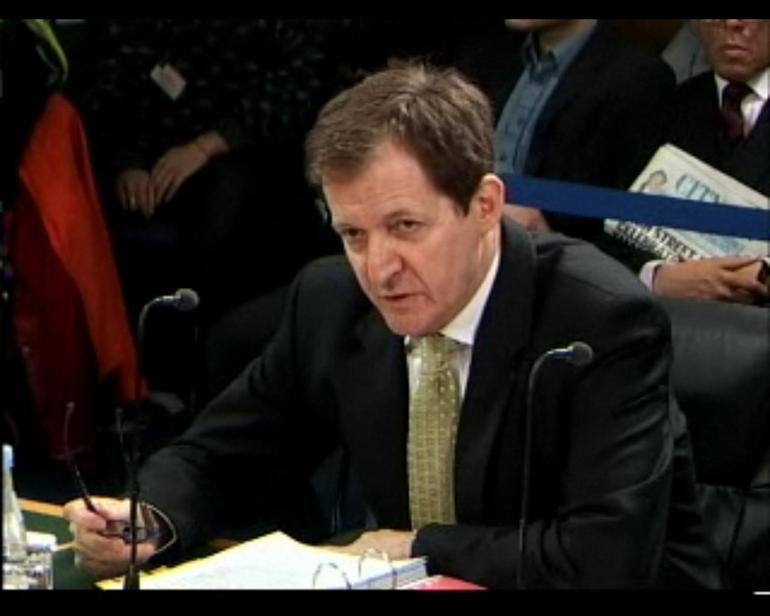
Alastair Campbell today rejected any suggestion that he ‘beefed up’ the 2002 dossier on Iraq’s weapons of mass destruction.
Speaking to the Iraq Inquiry, Campbell was questioned about his role in the production of the dossier published by the Government on 24 September 2002 in the build up to the invasion of Iraq.
Allegations that the dossier was “sexed-up” to strengthen the case for war with Iraq formed the basis for journalist Andrew Gilligan’s controversial Today Programme broadcasts of May 2003.
Campbell said: “This was a very significant piece of communications, nothing like it had ever been done before…The whole way through it could not have been made clearer that nothing could override the intelligence judgements and Sir John Scarlett [chairman of the Joint Intelligence Committee] would have the single pen.”
Iraq Inquiry member Sir Lawrence Freedman noted that Campbell had a meeting with Sir John Scarlett on 11 September 2002, after which “a note went around” saying that: “Number Ten wants the document to be as strong as possible within the bounds of available intelligence”.
Campbell said: “At no point did I ask him to beef up any of the judgments that he had”.
After further questioning along these lines, Campbell added: “At no point did anyone from the PM down say to anyone in the intelligence services ‘you’ve got to tailor it to fit this argument or that argument.'”
Making reference to the Gilligan broadcast and the subsequent row between the BBC and the Government which culminated in the Hutton Report of January 2004, Campbell said: “I don’t think we would be having this exchange if it was not for the controversy that subsequently existed”.
When asked by the panel whether the JIC might have been “subconsciously influenced to make the dossier stronger than it would have been” Campbell said: “I don’t accept that at all because of the nature of John Scarlett…the PM was absolutely clear that the Joint Intelligence Committee had to be happy with that document in terms of its emphasis.”
One of the more controversial sections of the dossier stated: “Iraq’s military forces are able to use chemical and biological weapons, with command, control and logistical arrangements in place. The Iraqi military are able to deploy these weapons within 45 minutes of a decision to do so.”
The hearing was told this section was in fact a reference to battlefield munitions but that, because of the wording around it in the dossier, was interpreted by several newspapers as implying that WMD could be launched with inter-ballistic missiles against Cyprus within 45 minutes of an order to do so.
Making reference to the fact that an earlier draft of the report had a timeframe of 20-45 minutes, Campbell said: “If we’d have been in the sexing up game we’d have said come on let’s make it 20 rather than 45 minutes”.
He added: “If one or two papers went down that line they weren’t pushed there by us.”
He later insisted: “We did not see it and plan our communications strategy around that particular point.”
The panel pointed out that the headline in that day’s Evening Standard read: “45 minutes from attack” and that headlines in the following day’s Sun and Daily Express respectively said: “Brits 45 minutes from doom” and “Saddam can strike in 45 minutes”.
Campbell said: “There’s a misconception that I care a lot about headlines. I don’t now, and I didn’t when I was in Downing Street.”
He said that an effective communications strategy is not about individual headlines, but about getting a message across over a longer period.
He said: “I defend every single word of the dossier, I defend every single part of the process. It was a genuine attempt to engage the public properly in understanding why the PM’s thinking was developing as it was.”
In the afternoon session Campbell was questioned on the document: “Iraq – Its Infrastructure of Concealment Deception and Intimidation”, printed on the Number 10 website and which Channel 4 news revealed had been plagiarised.
Campbell admitted the document did not go through the “same rigorous process the September dossier did”.
He also conceded that it was “a very difficult situation” when no WMDs were found in Iraq.
The British media’s coverage of the political debate surrounding the Iraq War was dismissed by Campbell as “flim flam”.
Campbell finished the session by saying: “I am very very proud of the part I played.”
Email pged@pressgazette.co.uk to point out mistakes, provide story tips or send in a letter for publication on our "Letters Page" blog
